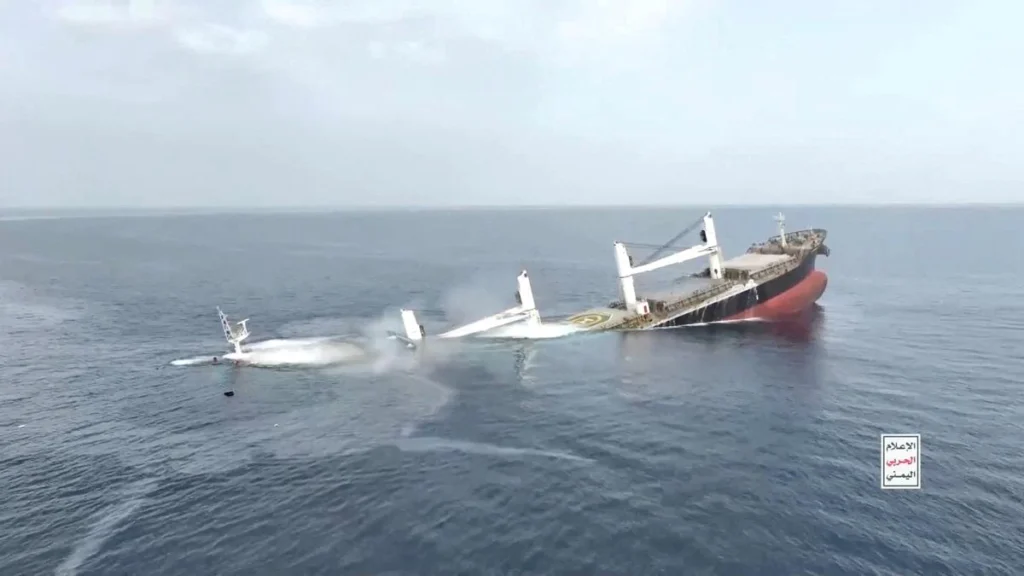Search ends for missing crew after Yemen’s Houthi rebels sink ship in Red Sea

Houthi rebels in Yemen attacked and sank a commercial vessel in the Red Sea, leaving 11 crew members missing. The Syrian Observatory for Human Rights reported that at least 37 people were killed, with 27 of them Druze, including two children, and 10 Bedouin. Ten others survived the attack, but the missing crew members remain unaccounted for.
The attack raises concerns about the safety of international shipping in the region. The Red Sea is one of the busiest maritime routes in the world, linking the Mediterranean Sea to the Arabian Gulf. This attack has once again highlighted the risks faced by commercial vessels passing through the area amid ongoing conflict.
The Attack and Immediate Aftermath
The vessel, a commercial cargo ship, was traveling through the Bab el-Mandeb Strait when the rebels fired a missile or explosive device. The missile hit the ship, causing significant damage and leading to its sinking. Nearby ships quickly came to the rescue, saving ten crew members. Despite these efforts, the search for the remaining crew members has proven challenging. Authorities ended the search after failing to locate the others, and four crew members are presumed dead.
Security forces, including the Syrian Arab Army, intervened to restore order. However, tensions remain high, and the situation continues to cause concern.
Houthi Rebels Targeting Maritime Traffic
The Houthi rebels, backed by Iran, have a long history of targeting maritime traffic in the Red Sea. This is part of their broader strategy to disrupt the Saudi-led coalition’s control of the region and assert their influence. The Bab el-Mandeb Strait has become a hotspot for such attacks, which include both military and commercial vessels.
The attack on this cargo ship is only the latest in a series of incidents. In previous years, the Houthis have used drones, missiles, and small boats to target vessels navigating the Red Sea. They argue that these attacks are a form of resistance against Saudi Arabia and other nations involved in the Yemeni civil war. However, the international community has condemned these actions as a threat to global shipping and the safety of civilian vessels.
Global Shipping and Security Concerns
The Bab el-Mandeb Strait is a critical waterway for global trade. An estimated 10% of global maritime trade passes through it annually. This includes goods traveling between Europe, the Middle East, and Asia. The recent attack underscores the vulnerability of this key passage and the growing threats to global shipping. International shipping companies and governments are now reassessing how to ensure the safety of merchant vessels in the region.
The U.S. and other Western nations have expressed concerns about the rising attacks and have increased naval presence in the Red Sea to protect international shipping. However, enforcing maritime security in a conflict zone is difficult, and the Houthis continue to pose a significant risk.
The Human Impact and Consequences
The human cost of this conflict has been devastating. The death of 37 crew members, including two children, highlights the ongoing risks that civilians face in war zones. While some of the survivors were rescued, their traumatic experiences will have lasting effects. These incidents also draw attention to the larger humanitarian crisis in Yemen, where millions of people are suffering due to the conflict, hunger, and lack of medical care.
The attack on this commercial ship further demonstrates the vulnerability of civilians caught in the crossfire of the war. Both local populations and international workers are paying the price for the ongoing conflict. The situation has sparked outrage from human rights organizations, who are calling for greater protection of civilians and an end to attacks on merchant vessels.
Calls for Action and Accountability
The international community has responded to the incident with condemnation. The United Nations, the International Maritime Organization (IMO), and several human rights organizations have urged the Houthis to cease attacks on civilian ships. They have also called for stronger enforcement of international law to prevent further violence. The U.N. has expressed concern about the mounting threats to global shipping and the long-term implications of these attacks on regional stability.
Experts argue that the only way to ensure long-term security is through diplomatic efforts aimed at resolving the underlying causes of the conflict in Yemen. The lack of effective peace talks has allowed the Houthis and other factions to continue targeting vulnerable civilian populations, including those involved in international trade. Without a lasting peace agreement, such attacks are likely to continue, further destabilizing the region.
Conclusion
The attack on the commercial vessel in the Red Sea serves as a stark reminder of the ongoing dangers in Yemen and the broader Middle East. While the immediate human cost is tragic, the long-term impact on global shipping could be significant if these attacks continue. The international community must come together to hold the Houthis accountable and take meaningful action to protect civilian vessels. However, the solution to this crisis lies in a broader political resolution that can end the conflict and secure the future of the Red Sea and its maritime traffic.
As the search for the missing crew members ends, the focus must shift to preventing future incidents. This means improving security, enforcing international law, and working towards peace in Yemen. The risks posed by continued violence are high, and without effective intervention, the security of global shipping in the region will remain under threat.






